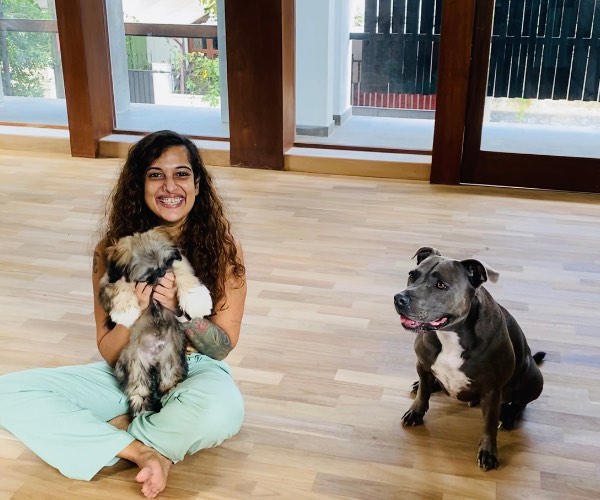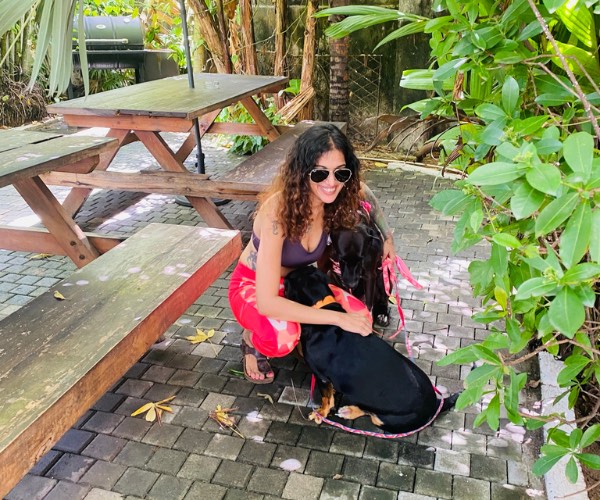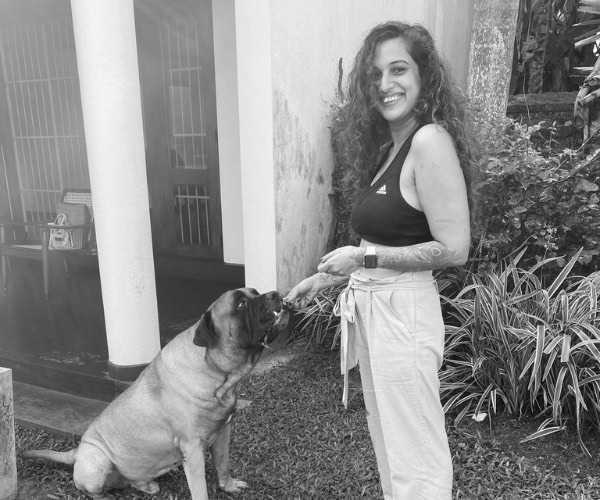
May 29 2023.
views 436


Unlocking the potential of online training, one dog at a time, meet Ashwini Aiyar, a pioneering dog trainer who is revolutionizing the industry. With a passion for canine care and a deep understanding of dog behaviour, she has embraced the power of virtual training to provide effective and humane solutions for dogs and their owners. Armed with multiple certifications and years of experience, she has successfully conducted thousands of virtual training sessions, addressing a wide range of behaviour issues. Her innovative approach, rooted in fear-free training methods, emphasizes communication, understanding, and improving the quality of life for our beloved four-legged friends. Discover the transformative power of online training as she shares her insights, successes, and unwavering commitment to promoting compassionate dog training practices.
What made you venture into becoming a dog trainer?
My love for dogs was something I was born with. Even as a child, I had a tremendous affinity with the species and my dream as a little girl was to live in a house with as many dogs as possible. And I guess that was what I ended up doing. My very first venture into canine care was 14 years ago when I opened up Sri Lanka’s first dog hotel. The catalyst was the death of my mother and as I began deeper ruminating on life and its meaning, three days after her funeral I decided I would do something of myself to honour her and there I decided to work with dogs. Using a little money I received from a collection in my mum’s workplace after her death I built three rudimentary spaces in a one-acre property I then lived in. I was already working two jobs but figured hey- if it pays one bill then it is good enough. Little did I know how popular it would be and I was able to work full-time as a kennel owner pretty quickly. I then began to try my hand and as a result pioneer a range of canine care services from pet relocation, to doggie daycare, pet cremation and even the first doggie swimming pool but it was not long before I found my heart in training. I went on the become the first certified dog behaviourist to train in Sri Lanka. Understanding dogs and teaching people to be better guardians of them was the space within which I felt happiest and also where I felt I was most needed.
What are your qualifications and background as a dog trainer?
I have three different certifications in dog training and am currently reading for a fourth. The first is from a UK organisation called the CIBT in conjunction with Middlesex University, the second I studied under world-famous author and trainer Brenda Aloff as her first international student, the third is a force and fear-free certification from a US organisation that took me through 48 courses on how to train both ff, but also in the virtual medium. I was also granted the inaugural award for Innovation and Entrepreneurial Accomplishment and was named Entrepreneur of the Year under this category by the Women’s Chamber of Commerce in 2017. My experience spans 14 years and I have had the privilege of conducting over 5000 virtual training sessions in the last three years.
Can you explain the concept of "fear-free" dog training and how it differs from other training methods?
I do not think particularly here that people understand what a dog trainer is. A dog trainer is not someone who has owned, bred, or raised dogs. It is not someone who has ‘experience’ with dogs. It is not someone who has a dog care business. A dog trainer is someone who has studied dog behaviour and I think when choosing a trainer you should start there.
Fear and Force Free dog training is a branch of training that is relatively new. Its hallmark is that we do not use force in our method and focus more on using rewards. Dog training has been an industry that still has little to no regulation on how dogs are treated. And as a result, owners do not know how to recognise different techniques. I am currently the only Force and Fear Free practising trainer in Sri Lanka.
A FF trainer like me would not use any ‘compulsion’ to obtain a response from a dog, meaning no tugging, pulling and bodily manoeuvring, we also do not use ‘punishment’ meaning no leash ‘corrections’ ‘pops’ or ‘snaps’. We also do not use aversives which in dog training terms are devices that cause pain or discomfort to a dog like a choke chain, head collar or shock collar. Generally, we also use treats which is another to recognise a FF trainer.
While to a trainer the differentiation may be technical, I think as a dog owner you should recognise FF training as the most humane way of educating your dog. Most trainers who train in this way are certified, are required to obtain continuing education, and have invested many years in the study of dog behaviour.
What types of training programs do you typically conduct for dogs?
My main focus is on virtual training and this is because of the ability it gives me to train all over the world and also because I truly believe in the medium. But I also do a fair amount of in-person work in Sri Lanka as well. They can be at the owner’s home or at my own. This would depend, but all training programmes start online.
What are some common behaviour issues that you see in dogs, and how do you address them?
This is rather complex to answer in brief as it is heavily case-dependent, but I think the number one error I see is a lack of understanding about dogs and dog ownership. Most cases are not displaced behaviours but unmet needs and it is important not to confuse the two. I also find that I do not really train dogs or people, most of what I do is act as an intermediary between a human’s desires and an animal’s welfare and capabilities.
I have eight different specialities but I would say my main wheelhouse is probably aggression. Aggression is complex and also somewhat dangerous to train for. Correcting aggression varies on the type and often requires a behaviour plan of about a year.
Other common ones include play biting with puppies and also leash work.
How do you work with dogs that have experienced trauma or abuse?
Here it would depend on how the dog is displaying signs of the trauma. I have worked a variety of trauma cases including even a gunshot wound and it really does depend on what you see in the dog themselves. Some dogs become heavily anxious and others aggressive. The training program for each differs accordingly.
What are the most important aspects of dog ownership and training? Why are they important?
For me, it is always quality of life. A dog is an animal in captivity and it doesn’t have any agency. Their lives can often be quite bleak. Ensuring that a dog is adequately mentally and physically exercised is essential to achieving this. Walks and brain games should be a part of every dog’s routine.
Enrichment/decompression is the next thing I would look at. A dog needs to spend time doing dog-like activities like sniffing, licking or chewing. They have many vital functions but mostly they dramatically improve the quality of a dog’s life.
Finally, I would say that training is not about obedience it is about understanding. A deeper understanding of your dog will allow for better communication and will strengthen the bond between the handler and the dog.
I chose these three things because without them all training will fail. Many a time just the improvement of quality of life solves what owners think are ‘behavioural issues’.
How do you work with owners to ensure that they are reinforcing the training when they are not with their dogs?
I give them training plans and precise instructions. We have week-by-week homework sheets and some of these need to be logged. But I do also spend a lot of time educating the client on the work component before taking a case and if there is no possibility for them to do the work then I do not take the case. Maybe I am a strict teacher- but all my students are excellent and do more work than I could hope for really.
What are some of the most challenging aspects of dog training, and how do you address those challenges?
There is only one thing I find frustrating about my job and I think this frustration is shared by many trainers and that is the lack of information about humane dog training practices. There is also a large gap in information about how dogs think and learn. It is my deepest desire to see a change in this and by putting out quality information I hope to be a catalyst to that change.
But other than that I have to be honest and say I do not find my job challenging. It is a lot of work and responsibility but I do this all day every day rather happily. It is an honour for me to work with these amazing animals and to have found a way to have translated an obsession into work is quite something. You won’t catch me complaining about that at all!
Can you provide examples of some of your most successful dog training cases, and what you did to achieve those results?
I enjoy a very high success rate, but I credit my teachers and colleagues who have designed or shown me how to execute the learning format. Dog training is just that really- it’s a format which you follow, over time, and then it works.
The harder cases are of course my favourites, from Bindi an anxiety case in Minnesota where it took me seven months to capture a laydown, to Ray my little gunshot case, who would not walk on a hardwood floor with her bag leg, to Masen who had such bad reactivity and would not even take a treat outside. Following behaviour plans and giving the owner guided coaching and lessons, and of course, ensuring the dogs had a good quality of life resulted in amazing success for all of these dogs!
How do you keep up with the latest research and trends in dog training, and incorporate that knowledge into your practice?
I spend hours brushing up on research and technique. I read a lot of books, and follow a lot of trainers but I learn the most from my peers. I have case discussions with trainers all over the world and that is what keeps me current in my methods.
How do you involve the owners in the training process, and what role do they play in the training of their dogs?
The training process is one hundred per cent the owners. I will only take a residential case if it is very bad the rest of them meet me online, so they are the heavy lifters. In-person sessions mean I coach at a distance I do not typically touch a dog unless I have to. Training is about the owner and the dog. I am only the guide. The rest is up to them!
You also work with companies in the US. Tell me a little bit about it.
I work with two companies in the US as a behaviour consultant in a virtual capacity. Most of my clients are in the US and Canada at the moment. I also am a member of the behaviour team meaning I get to coach other trainers as well. The work is amazing and also insane in the fact that I get to do it from here and working with foreign companies has taught me so much about work ethic and consistency. I also get to meet other trainers and learn from them too!
Can you explain your approach to online training for dogs, and how effective it is compared to in-person training?
Online training is fantastic. In some ways like heavy anxiety or stranger aversion, it is probably the only way, but even in general it is a superb medium. The convenience of it is remarkable and owners and trainers are able to do the sessions with minimal stress and zero logistics. It is also inexpensive in comparison to other mediums.
Apart from its efficacy, the reason I push it so hard is because it is the least invasive and also there are no cheats. The owner has to do the work themselves, and that is so important. We as dog trainers know how to get dogs to do stuff we are trained in this field but the real skill is telling an owner how to achieve the same and I feel they learn a lot better on the online medium.
Photos courtesy of Ashwini Aiyar
0 Comments